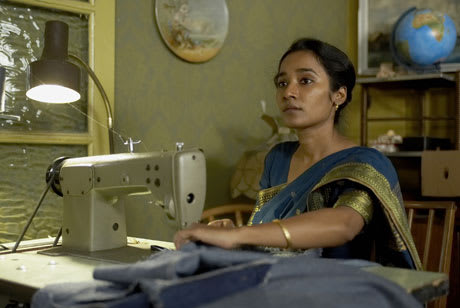Certainly safer and potentially more accessible to a broader audience than Monica Alis controversial novel, Brick Lane partially succeeds as an examination of an oppressed Muslim woman reluctant to voice her own opinions and desires. The characters are closely examined with care and consideration but are never given a greater sense of urgency, aside from mild discontent in uncontrolled surroundings.
Born of a poor Bangladeshi family, Nazneen (Tannishtha Chatterjee) is sold off to the older Chanu (Satish Kaushik) after the death of her mother and sent to London to be a proper Muslim wife and mother to two daughters (Naeema Begum and Lana Rahman).
After being overlooked for various promotions, Chanu decides to quit his job in favour of foolish and potentially unrealistic opportunities. He even goes so far as to borrow money from a loan shark neighbour to buy a computer. To supplement the income, Nazneen starts her own home-based sewing business, which threatens the patriarchal sensibilities of her husband.
Feeling somewhat isolated and trapped in her passionless marriage, Nazneen is flattered when she is the object of some attention from Karim (Christopher Simpson), who brings her clothing to sew. Her affair with the younger man begins to sour after the events of September 11 turn him into a political radical.
Some of the struggle in translating the power of the novel onto the big screen likely stems from the inherent meekness of Nazneen. Her struggles are mostly internal, as her main weakness is an inability to speak her mind. Occasional voiceovers help provide some insights, as do lingering scenes of household discontent from director Gavron, but her rebellion isnt entirely logical or justified. This also stems from a relatively flat performance from Chatterjee.
Despite this core flaw, Brick Lane is an engaging and well-photographed character study. It is just unfortunate that a great deal of identification and empathy must stem from forces external to the film itself.
(Mongrel Media)Born of a poor Bangladeshi family, Nazneen (Tannishtha Chatterjee) is sold off to the older Chanu (Satish Kaushik) after the death of her mother and sent to London to be a proper Muslim wife and mother to two daughters (Naeema Begum and Lana Rahman).
After being overlooked for various promotions, Chanu decides to quit his job in favour of foolish and potentially unrealistic opportunities. He even goes so far as to borrow money from a loan shark neighbour to buy a computer. To supplement the income, Nazneen starts her own home-based sewing business, which threatens the patriarchal sensibilities of her husband.
Feeling somewhat isolated and trapped in her passionless marriage, Nazneen is flattered when she is the object of some attention from Karim (Christopher Simpson), who brings her clothing to sew. Her affair with the younger man begins to sour after the events of September 11 turn him into a political radical.
Some of the struggle in translating the power of the novel onto the big screen likely stems from the inherent meekness of Nazneen. Her struggles are mostly internal, as her main weakness is an inability to speak her mind. Occasional voiceovers help provide some insights, as do lingering scenes of household discontent from director Gavron, but her rebellion isnt entirely logical or justified. This also stems from a relatively flat performance from Chatterjee.
Despite this core flaw, Brick Lane is an engaging and well-photographed character study. It is just unfortunate that a great deal of identification and empathy must stem from forces external to the film itself.
